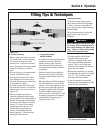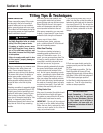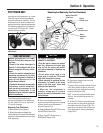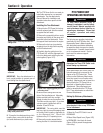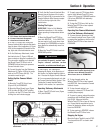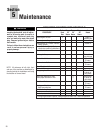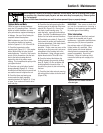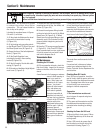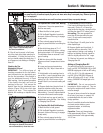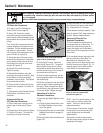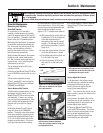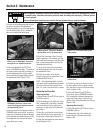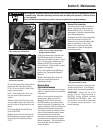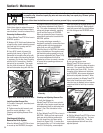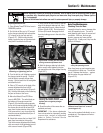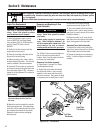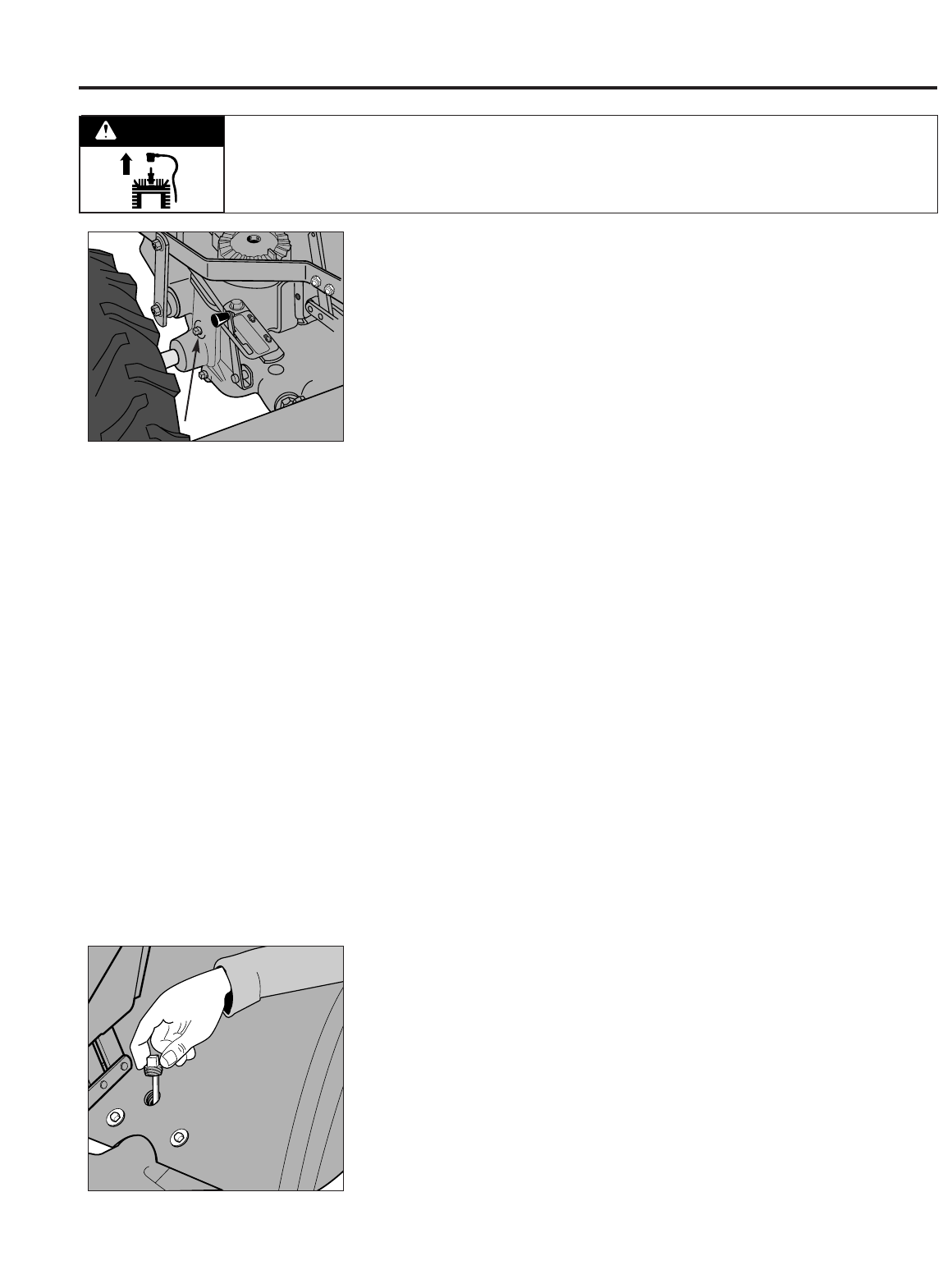
Section 5: Maintenance
3. If the oil level is correct, oil will seep
out of the check hole (allow extra time in
cold weather). If it does, the level is fine
and you should replace the check plug. If
no oil seeps out, see
Adding or Changing
Gear Oil
.
Checking the Tine
Attachment Oil Level
IMPORTANT: Two different gear oil
checking procedures for the tine attach-
ment transmission are described next.
Use the first procedure if the dipstick in
your tine attachment has only a ‘Check
Cold’ marking. Use the second procedure
if the dipstick has both cold and hot
markings at the end. First remove the
dipstick from the tine attachment trans-
mission (Figure 5-8) to see which type
dipstick you have. Then replace the
dipstick with markings on dipstick facing
to rear.
For Dipsticks With ‘Check Cold’ Marking
(Cold means 2 hours has passed since
the tiller was used.)
1. Move the tiller to level ground.
2. Pull the Depth Regulator Lever back,
then push it down all the way (to engage
its top notch).
3. Place a sturdy support under the
engine to prevent the tiller from tilting too
far.
4. Now slide three pieces of 2" x 4"
lumber underneath the drag bar– raising
the drag bar about 4-1/2" above ground.
This elevation allows an accurate “cold”
gear oil reading .
5. Wait two hours with tiller elevated
(allow more time if temperature is below
40
o
F).
6. Loosen and remove transmission
dipstick (Fig. 5-8). Wipe it clean with a
rag.
7. Hold dipstick so its markings face to
rear of tiller. Lower it straight down into
the sump hole to
touch the drive shaft
inside (Fig. 5-8). Don’t force or try to
thread it back in; an incorrect reading will
result.
8. Remove dipstick and check oil level. It
should be anywhere within the cross-
hatched area or even slightly above the
Max marking. If correct, replace dipstick
and remove the boards used as props.
9. If oil level was low, gear oil must be
added before using the tiller. See Adding
or Changing Gear Oil next.
For Dipsticks With Hot/Cold Markings
1. Move the tiller to level ground.
2. Pull the Depth Regulator Lever back,
then push it down all the way (to engage
its top notch).
3. Place a sturdy support under the
engine to prevent the tiller from tilting too
far.
4. Cold reading (preferred method):
(Two hours has passed since the tiller
was used.) Place a 2" x 4" board (on
edge) under the drag bar– raising the tiller
and drag bar about 3-1/2" above ground.
Hot reading: (Tiller was operated for
more than 30 minutes within the past
hour.) Do not use the wood prop to
elevate the tiller.
5. Follow Steps 4, 5 and 6 given for the
other dipstick type.
6. Remove dipstick and check level. It
should be within or above the “Cold”
range marking if taking a cold reading. If
taking a hot reading, the level should be
within or slightly above the “Hot” range.
7. If the level is incorrect, see Adding or
Changing Gear Oil.
Adding or Changing Gear Oil
For partial fill-ups (just a few ounces or
less), use SAE 140, SAE 85W-140, or SAE
80W-90 weight gear oil with an API rating
of GL-4 or GL-5. For full replacement,
use SAE 140 or SAE 85W-140 gear oil
with an API rating of GL-4 only. (At the
factory, SAE 85W-140 weight gear oil is
used.)
IMPORTANT: Do not use automatic
transmission fluid or engine oil. They are
too light in weight and will result in trans-
mission damage.
The gear oil does not need to be changed.
Do so only if you know, or suspect, it is
contaminated with dirt, sand or other
foreign particles.
Gear oil is available at authorized dealers
and most service stations, power
equipment centers, or farm/heavy
equipment outlets.
Capacities: Power unit transmission
holds approximately 60 ozs.; Tine Attach-
ment transmission holds approximately
12-1/2" ozs.
Figure 5-7: Remove oil level check
plug. Gear oil should seep out if
the level is sufficient.
Figure 5-8: Checking gear oil level;
markings on dipstick (tine attach-
ment transmission) must face rear.
➧
Before inspecting, cleaning or servicing the machine, shut off engine, wait for all moving parts to come
to a complete stop, disconnect spark plug wire and move wire away from spark plug. Remove ignition
key, if so equipped.
Failure to follow these instructions can result in serious personal injury or property damage.
WARNING
31



